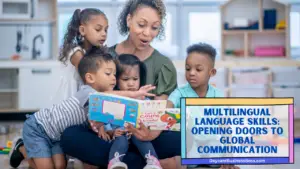The concept of daycare has expanded beyond its traditional confines in the ever-changing world of childcare. Modern parents want more than simply a safe place for their children; they want an environment that encourages inquiry, growth, and potential. This pursuit of holistic development has resulted in a plethora of unique childcare business concepts that go beyond the typical paradigm.
The best way to diversify daycare offerings is to explore innovative ideas, such as nature-themed outdoor education, tech-focused with STEM activities, creative arts nurturing expression, multilingual fostering language skills, intergenerational for unique connections, and flexible-hour catering to diverse schedules.
This article sets out on a trip to discover these transformative daycare concepts, investigating how they not only meet the requirements of today’s families but also mold the minds of tomorrow’s children. Join us as we explore a world in which childcare is more than just a service, but a catalyst for developing lifelong learners and future leaders.
Nature-Themed Outdoor Education: Nurturing a Love for Nature

Nature-themed daycare, often known as outdoor education, is an enticing notion that bridges the gap between children and their surroundings. This novel technique capitalizes on children’s natural curiosity, helping them to form meaningful connections with the natural world. This type of childcare provides much more than a change of scenery by effortlessly incorporating outdoor activities into the curriculum; it creates an exceptional spirit of discovery and adventure that leaves a lasting impression.
Children who participate in nature-themed programs start on a voyage of discovery that extends beyond the walls of their indoor classrooms. They get a better grasp of their surroundings and the intricate ecosystems that shape them via hands-on activities in natural settings. They get a strong awareness of the fragile balance of nature and the role they play in its preservation as they explore forests, gardens, and open areas.
The ability of nature-themed childcare to create a genuine passion for the outdoors is one of its astonishing benefits. Children who participate in these programs frequently build a strong emotional relationship with the natural environment, cultivating a bond that lasts far beyond their formative years. As kids absorb the necessity of caring for the earth, this link lays the scene for a lifetime of environmental knowledge and responsible stewardship.
Aside from obvious physical health benefits, nature-themed childcare is a potent stimulant for cognitive and emotional development. The great outdoors is a blank canvas for endless learning opportunities, promoting critical thinking, problem-solving, and creativity. Children are continually involved in interesting activities that support holistic growth, whether it is identifying different plant species, studying animal behavior, or experimenting with environmental aspects.
The immersion nature of outdoor education fosters a strong feeling of wonder and curiosity. Children ask questions, seek answers, and marvel at nature’s wonders, sparking a lifetime love of learning. This natural desire to explore and learn not only stimulates intellectual growth but also fosters emotional intelligence by instilling empathy and compassion for all living beings.
Read more about: Ready, Care, Grow: Your Daycare Startup Checklist
Tech-Focused STEM Activities: Cultivating Future Innovators
In an era characterized by rapid technological growth, technology has had a tremendous impact on early education. As screens grow more prevalent and digital technologies pervade every aspect of life, a fundamental shift in the way children learn, interact, and interpret the world has occurred. The concept of a tech-focused daycare is at the vanguard of this transition, a dynamic approach that emphasizes the critical role of Science, Technology, Engineering, and Mathematics (STEM) in developing young brains for the modern age.
A tech-focused daycare pushes beyond traditional bounds, bringing the power of STEM activities into the traditional childcare model. This integration is more than just keeping up with the times; it is about providing children with the tools and abilities they need to confidently and competently navigate a tech-driven landscape. From interactive apps geared for early learners to hands-on robotics projects, this environment’s array of age-appropriate tools and activities serves as the foundation for future proficiency.
Children learn a variety of critical skills through engaging with technology in a deliberate and guided manner. The most important of these is the development of problem-solving skills. Children learn to dissect difficult problems into manageable components and develop effective solutions as they negotiate puzzles, challenges, and digital settings. This approach fosters critical thinking, a cognitive capacity that transcends digital barriers and is essential for intellectual development.
Children are empowered to create, develop, and experiment with digital tools, thus creativity thrives in the tech-focused daycare setting. This creative outlet not only helps children to communicate their original thoughts but also encourages new thinking. STEM activities inspire youngsters to think outside the box, experiment without fear, and accept failure as a necessary step toward growth. These experiences build the framework for a new generation of innovators who will push technology’s frontiers and transform industries.
One of the most appealing parts of early childhood STEM involvement is its role in developing future inventors and innovators. A tech-focused daycare creates the groundwork for children to seek higher education and professions in these sectors by instilling a strong interest in STEM subjects at a young age. These young minds are more likely to interact with advanced technology concepts and contribute to game-changing innovations that influence society’s trajectory as they develop.
Creative Arts Expression: Unleashing Imagination and Emotion
Creativity is the foundation of human expression and growth, shaping the very nature of our evolution. The awareness that nurturing creativity in the early stages of life has transforming implications is at the heart of this notion. A childcare center that focuses a purposeful emphasis on creative arts activities, such as drawing, painting, music, and theater, offers up a world of possibilities for children to explore their imaginations and emotions.
Children who participate in creative arts have a unique opportunity for self-discovery and expression. This boosts their self-esteem and confidence, allowing them to appreciate their originality and distinctiveness. Children become agents of their own stories as they explore with colors on canvas, tunes on instruments, and characters in dramatic performances, building a sense of empowerment that extends beyond their artistic activities.
The advantages of this method go well beyond personal development. Participating in creative arts activities improves cognitive abilities because it requires children to think critically, make decisions, and solve issues in inventive and innovative ways. Fine motor coordination is required for the careful strokes of a paintbrush or the harmonious creation of a symphony, which hones physical skills that ripple into other areas of development.
These artistic endeavors improve communication abilities. Children learn to express their thoughts, feelings, and narratives through a variety of mediums, which improves their capacity to interact with people and grasp their surroundings. The creative process is not limited to art; it is an attitude that pervades all aspects of learning and inquiry.
The daycare center gives youngsters a significant advantage by cultivating their artistic spirit—the capacity to tackle issues with a fresh and innovative perspective. Creative thinking becomes second nature, preparing the path for a future in which these young brains may imagine answers to situations that others may find intractable.
Multilingual Language Skills: Opening Doors to Global Communication

The importance of multilingualism as a coveted ability cannot be emphasized in an era of unprecedented global connectivity. Its importance is amplified when it is woven into the fabric of early education. The implementation of language immersion programs in daycare facilities catalyzes the development of language competency and cultural consciousness, kicking off a transformative journey at a young age.
Language immersion programs at daycare provide a hands-on introduction to the world of languages and cultures. These programs provide a one-of-a-kind combination of linguistic exposure and cultural discovery, helping youngsters to acquire not only the words but also the nuances of expression that create dialogue. Young minds start on a journey of discovery that extends beyond vocabulary into the complexities of syntax, intonation, and cultural context as they engage in discussions, music, and stories in many languages.
Aside from the obvious linguistic benefits, bilingual or multilingual youngsters gain a variety of cognitive advantages. According to studies, their cognitive flexibility improves, allowing individuals to easily transition between languages and adapt to diverse linguistic circumstances. This cognitive agility extends to problem-solving abilities, as they become competent at tackling difficulties from a variety of perspectives, aided by the many linguistic frameworks through which they travel.
Multilingualism promotes a larger vision. Children are naturally exposed to other cultures, ideas, and ways of thinking when they are exposed to different languages. This early exposure to varied cultural standards fosters an understanding of the complexities of global human interactions. Children who are bilingual or multilingual acquire a natural ability to bridge cultural divides and foster cross-cultural understanding, which is crucial in today’s interconnected world.
These benefits not only enhance personal development but also provide youngsters with essential abilities for international communication and collaboration. These language abilities will easily merge into their professional lives as they mature, giving them a competitive advantage in a work market that prizes cross-cultural ability.
Read more about: Raising Tomorrow: The Strategic Business Plan for Your Daycare Center
Intergenerational Connections: Bridging the Gap Between Generations
The original concept of intergenerational childcare bridges the generational divide ingeniously, providing a pleasant setting in which youngsters and seniors engage in a symbiotic interaction that benefits both of their lives. This amazing technique not only redefines typical daycare borders but also develops a tapestry of interconnectedness and shared experiences that transcend age.
The opportunity to contact seniors provides children with a window into a world rich in wisdom, tales, and experiences. As they listen to stories from the past and engage in conversations, the youngsters learn essential life lessons that textbooks cannot teach. The presence of older generations acts as a living archive, providing insights into history and culture that textbooks cannot. When children learn to appreciate the various travels that have molded the lives of their elder companions, these exchanges foster empathy and respect.
Seniors who participate in intergenerational daycare enjoy significant benefits. Meaningful connections with youngsters instill renewed meaning and connection in their life, lessening feelings of loneliness that can follow aging. The children’s laughing, curiosity, and vitality act as a balm for their emotional well-being, combatting loneliness and building a sense of belonging. These encounters also provide cognitive stimulation by allowing elders to reflect, communicate, and participate in activities that keep their minds flexible and lively.
Intergenerational activities weave a complex tapestry of viewpoints, knowledge, and companionship flawlessly. The combination of young zeal and seasoned knowledge fosters an environment of reciprocal learning in which each member contributes and benefits. Children unwittingly pass on technical knowledge, whereas the elderly provide timeless ideas anchored in life experience. This synthesis promotes holistic development by encouraging open-mindedness and adaptation in both generations.
Intergenerational daycare unquestionably improves the lives of everyone involved. The youngsters grow up with an unrivaled understanding of the worth of experience and the treasures of human connection. Meanwhile, elders feel a revitalized sense of purpose and emotional fulfillment, forming friendships that transcend age and reminding them that their stories are valued and their presence is meaningful.
Flexible-Hour Scheduling: Catering to Modern Lifestyles
The traditional 9-to-5 routine has undergone a dramatic transition in today’s fast-paced lifestyles, particularly for parents juggling career commitments with childcare responsibilities. As a result of this changing reality, daycare centers with flexible-hour scheduling have developed as a lifeline, catering to the requirements of parents who work irregular hours or have demanding occupations. This novel strategy not only handles the logistical issues that working parents encounter but also fosters a healthy balance between their professional and home life.
The introduction of flexible-hour daycare has considerably reduced the stress experienced by parents navigating the convoluted maze of irregular schedules. This customized childcare option provides a reassuring retreat for people whose work extends beyond the constraints of the regular workweek. Parents can feel secure and at ease knowing that their child is in capable hands no matter what time it is. This peace of mind is not only a practical comfort, but also an emotional reassurance, allowing parents to devote their full attention to their professional endeavors.
The impact of flexible-hour daycare, on the other hand, goes beyond administrative convenience. These centers help to develop a well-rounded work-life dynamic by catering to the different demands of working parents. Traditional lines between work and home life are blurring, necessitating a more adaptive approach. The availability of childcare during non-traditional hours allows parents to devote time to self-care, pursue personal interests, and participate in family activities that enrich their lives outside of their jobs.
This strategy emphasizes society’s recognition of the numerous roles that parents play, championing their aspirations and duties outside of their working life. It mirrors a commitment to inclusivity, acknowledging that job routes differ and family situations vary. By accepting the flexibility provided by these daycare centers, society advances work-life balance, mental well-being, and equality.
Frequently Asked Questions

What in particular is nature-themed outdoor education in daycare?
Outdoor activities, nature exploration, and environmental education are all part of nature-themed outdoor education in daycare. This strategy seeks to strengthen children’s connections with nature, improve their awareness of sustainability, and give them hands-on experiences in natural environments. Children acquire a sense of awe and appreciation for the environment through activities such as nature hikes, gardening, and outdoor play.
How does STEM-oriented childcare encourage STEM learning?
STEM (Science, Technology, Engineering, and Mathematics) activities in a tech-focused daycare foster hands-on exploration of technology ideas. Children interact with technologies that are appropriate for their age, such as robotics kits, coding games, and interactive educational apps. These exercises foster problem-solving abilities, critical thinking, and creativity in youngsters, preparing them for the digital world and possible future professions in technology.
What are the advantages of intergenerational daycare programs?
Intergenerational daycare programs bring children and the elderly together in a mutually beneficial atmosphere. Interaction with older generations provides children with insights, knowledge, and friendship while also cultivating empathy and respect. Seniors benefit from social interaction because it reduces feelings of isolation. This intergenerational interchange produces a one-of-a-kind blend of perspectives, which contributes to the overall development of all participants.
To learn more on how to start your own daycare checkout my startup documents here.
The information provided by DaycareBusinessBoss.com (“The Site”) is for general informational purposes only. All information on the Site is provided in good faith, however, we make no representation or warranty of any kind, express or implied, regarding the accuracy, adequacy, validity, reliability, availability or completeness of any information on the Site. Under no circumstance shall we have any liability to you for any loss or damage of any kind incurred as a result of the use of the Site or Reliance on any information provided on the Site. Your use of the Site and your reliance on any information on the Site is solely at your own risk.
This blog post is for educational purposes only and does not constitute legal advice. Please consult a legal expert to address your specific needs. Terms and Conditions. (https://daycarebusinessboss.com/terms-conditions/)

Meet Shawn Chun: Entrepreneur and Childcare Business Fan.
I’m a happy individual who happens to be an entrepreneur. I have owned several types of businesses in my life from a coffee shop to an import and export business to an online review business plus a few more and now I create online daycare business resources for those interested in starting new ventures. It’s demanding work but I love it. I do it for those passionate about their business and their goals. That’s why when I meet a childcare business owner, I see myself. I know how hard the struggle is to retain clients, find good employees and keep the business growing all while trying to stay competitive.
That’s why I created Daycare Business Boss: I want to help childcare business owners like you build a thriving business that brings you endless joy and supports your ideal lifestyle.


